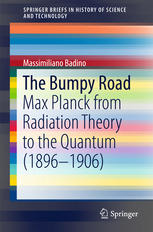

Most ebook files are in PDF format, so you can easily read them using various software such as Foxit Reader or directly on the Google Chrome browser.
Some ebook files are released by publishers in other formats such as .awz, .mobi, .epub, .fb2, etc. You may need to install specific software to read these formats on mobile/PC, such as Calibre.
Please read the tutorial at this link: https://ebookbell.com/faq
We offer FREE conversion to the popular formats you request; however, this may take some time. Therefore, right after payment, please email us, and we will try to provide the service as quickly as possible.
For some exceptional file formats or broken links (if any), please refrain from opening any disputes. Instead, email us first, and we will try to assist within a maximum of 6 hours.
EbookBell Team

4.4
12 reviewsThis book examines the different areas of knowledge, traditions, and conceptual resources that contributed to the building of Max Planck’s theory of radiation. It presents an insightful comparative analysis that not only sheds light upon a fundamental chapter in the history of modern physics, but also enlarges our understanding of how theoreticians work.
Coverage offers a deep investigation into the technical aspects behind the theory and extends in time the notion of quantum revolution. It also presents a full-fledged discussion of the combinatorial part of Planck’s theory and places emphasis on the epistemological role of mathematical practices. By painstakingly reconstructing both the electromagnetic and the combinatorial part of Planck’s black-body theory, the author shows how some apparently merely technical resources, such as the Fourier series, effectively contributed to shape the final form of Planck’s theory.
For decades, historians have debated the conditions of possibility of Max Planck’s discovery as a paradigmatic example of scientific revolution. In particular, the use of combinatorics, which eventually paved the way for the introduction of the quantum hypothesis, has remained a puzzle for experts. This book presents a fresh perspective on this important debate that will appeal to historians and philosophers of science.